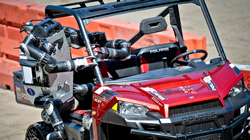Why Robots and Humans Struggled with DARPA's Challenge
 Will Knight for MIT Technology Review: When some of the world’s most advanced rescue robots are foiled by nothing more complex than a doorknob, you get a good sense of the challenge of making our homes and workplaces more automated.
Will Knight for MIT Technology Review: When some of the world’s most advanced rescue robots are foiled by nothing more complex than a doorknob, you get a good sense of the challenge of making our homes and workplaces more automated.At the DARPA Robotics Challenge, a contest held over the weekend in California, two dozen extremely sophisticated robots did their best to perform a series of tasks on an outdoor course, including turning a valve, climbing some steps, and opening a door (see “A Transformer Wins DARPA’s $2 Million Robotics Challenge”). Although a couple of robots managed to complete the course, others grasped thin air, walked into walls, or simply toppled over as if overcome with the sheer impossibility of it all. At the same time, efforts by human controllers to help the robots through their tasks may offer clues as to how human-machine collaboration could be deployed in various other settings.
“I think this is an opportunity for everybody to see how hard robotics really is,” says Mark Raibert, founder of Boston Dynamics, now owned by Google, which produced an extremely sophisticated humanoid robot called Atlas. Cont'd...
Comments (0)
This post does not have any comments. Be the first to leave a comment below.
Featured Product

Rapid Prototyping with the Modular Motor Series
Quick to configure. Quick to build. Quick to deliver. Parvalux understands the importance of getting product in the hands of customers quickly and efficiently. The Modular Range does just that allowing customers to configure their own solution, selecting motor and gearbox, adding encoders and brakes to create a solution perfectly suited for their specific applications such as conveyor belt systems, picking systems, parcel sorting equipment, pallet shuttles and automated storage and retrieval systems (ASRS). Read our modular range guide for specifics.
